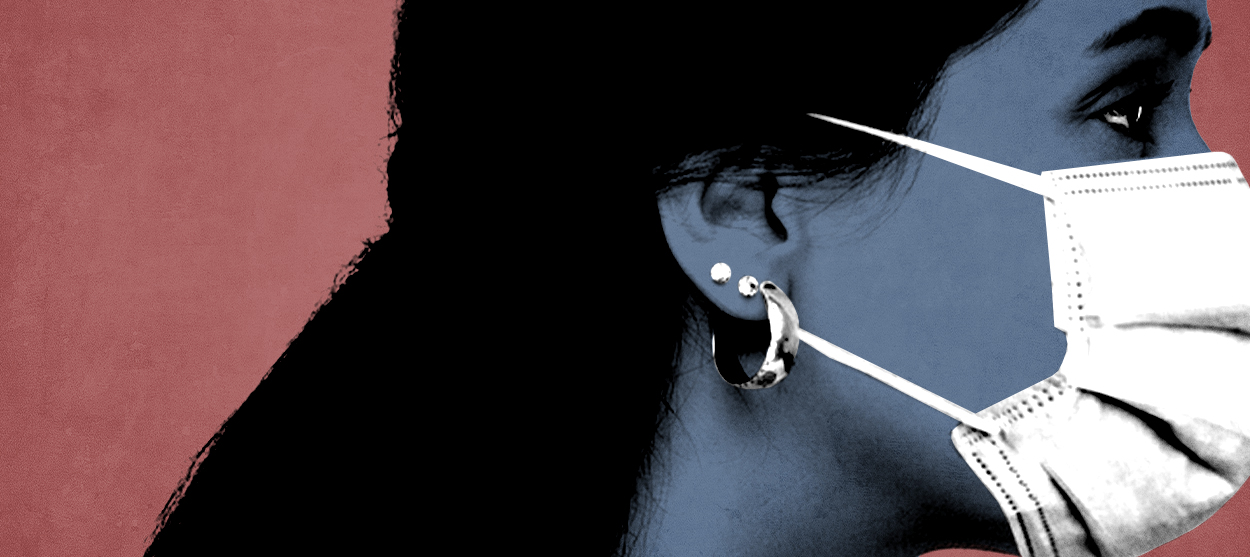Hopeful one minute, despairing the next
Navigating the wild emotional swings of our current pandemic state


A free daily email with the biggest news stories of the day – and the best features from TheWeek.com
You are now subscribed
Your newsletter sign-up was successful
Recently, I had to get a blood test. On my way out of the house, I grabbed two masks from the hooks by the front door: a disposable N95 on its umpteenth reuse, and a homemade cloth mask to cover it. As I got into the car and turned on the ignition, I crossed my fingers that the battery hadn't died — again — from disuse. When I arrived at the lab, the chairs were spaced sparsely around the waiting room and stickers on the floor admonished patients to stay six feet apart. I handed my lab slip under the Plexiglas shield at the front desk, and the staff took down my phone number so I could go wait in the car. The phlebotomist wore a surgical mask and a face shield; I wondered, but didn't ask, whether she'd gotten the vaccine yet. On the way home, I debated stopping at the grocery store and treating myself to a post-test snack, and decided against it. Too much risk for one day.
The whole experience was like something out of the dystopian novels I read in school. And yet the choreography was familiar enough that I knew it by heart. I've been doing a variation of it, every time I leave the house, for the past year. I expect to keep doing it for quite a while yet.
We're emerging from the wilderness of our first pandemic year, and the fluster and panic of the pandemic's earliest months has settled and mutated. We're in a strange, liminal state where we've already come a long way, but the light at the end of the tunnel is hazy at best. So how do we hang on through this messy middle time, balancing exhaustion, caution, and hope?
The Week
Escape your echo chamber. Get the facts behind the news, plus analysis from multiple perspectives.

Sign up for The Week's Free Newsletters
From our morning news briefing to a weekly Good News Newsletter, get the best of The Week delivered directly to your inbox.
From our morning news briefing to a weekly Good News Newsletter, get the best of The Week delivered directly to your inbox.
Like almost everyone I know, I have been spending my days swinging wildly between optimism and despair. Vaccination efforts are picking up speed even as new strains of the novel coronavirus pop up around the world. We're witnessing astonishing advances in medical technology and science, being made available to the public at lightning speed; we're also seeing those advances hampered by political ill will, incompetence, and plain old human error. We're constantly being reminded that the end of the pandemic is in sight, and simultaneously admonished that the worst is still to come. And the illnesses and deaths continue to mount.
Meanwhile, the stress of daily pandemic life is taking its toll. Nearly everyone I know has hit what the journalist Tanzina Vega has called "the pandemic wall," a state of profound burnout from trying to hold down pandemic-scrambled jobs and households, parent children, maintain social ties, and hang onto some semblance of financial and emotional security, all while dealing with the constant low-level fear that we or someone we love will be the next to fall ill. As Maura Judkis put it in The Washington Post, "In marathon running, 'hitting the wall' is predictable … Marathoners know that the finish line is not all that far past the wall, at 26.2 miles. We have no idea how close we are to the end of the pandemic."
Even for someone like me — who has already worked from home for years, who has no children and no current ongoing caregiving responsibilities, who is a homebody with plenty of indoor hobbies and a wide online social circle to keep me occupied — the indefiniteness is a weight on my body. Every day, I hear news of more loved ones getting vaccinated; I still have no idea when I will be able to hug them again. I struggle to imagine returning to my old routines, expanding back outward, when so many of us have spent so long curving our bodies and minds inward.
But there is hope, even in the noise. This is what I'm hanging onto, that the pandemic is indefinite but also finite. It will end, and our circumscribed lives will expand again even if we can't quite imagine how. I try to remind myself that the media in which I've been marinating is calibrated to thrive on outrage and gloom. In the swings between optimism and despair, I try to linger in the light: to seek out good news about the vaccines, to enjoy choosing which brightly colored mask to wear on a particular day, to check in with loved ones and hold them close — if only in spirit.
A free daily email with the biggest news stories of the day – and the best features from TheWeek.com
It feels like an impossible task, this: keeping exhaustion and grief and anger at bay for who knows how long, while simultaneously holding caution and hope in a delicate balance. I don't know exactly how the majority of us will get through, or how long it'll take to reach the other side. But I know that we will arrive. I have to believe we will.
Zoe Fenson is a freelance writer based in the San Francisco Bay Area. Her writing has appeared in Longreads, Narratively, The New Republic, and elsewhere. When she's not writing, you'll find her doing crossword puzzles in cocktail bars or playing fetch with her cat.
